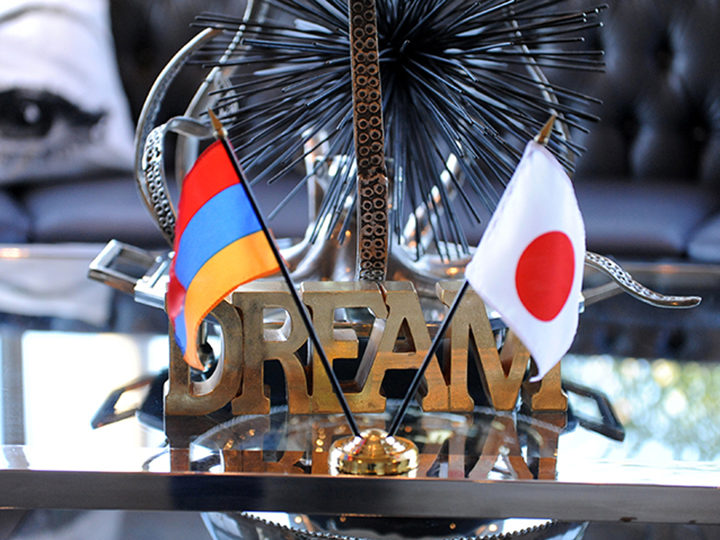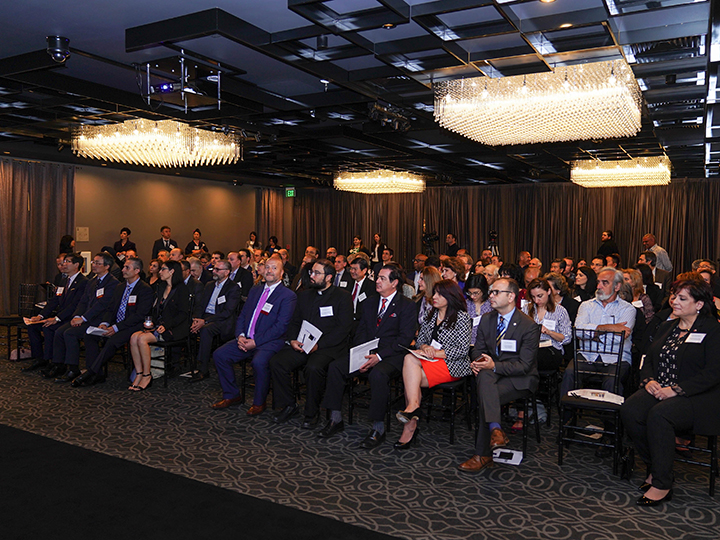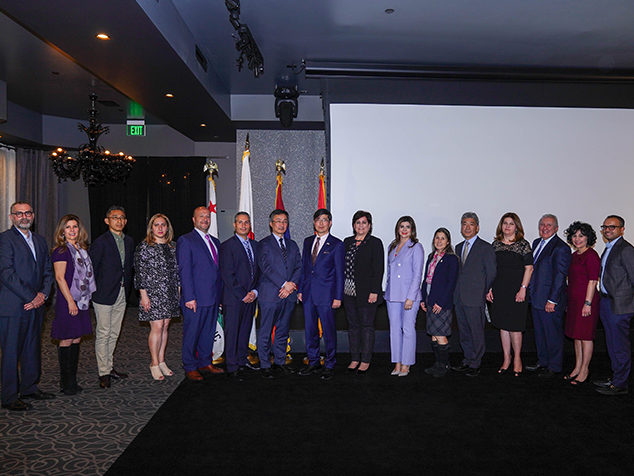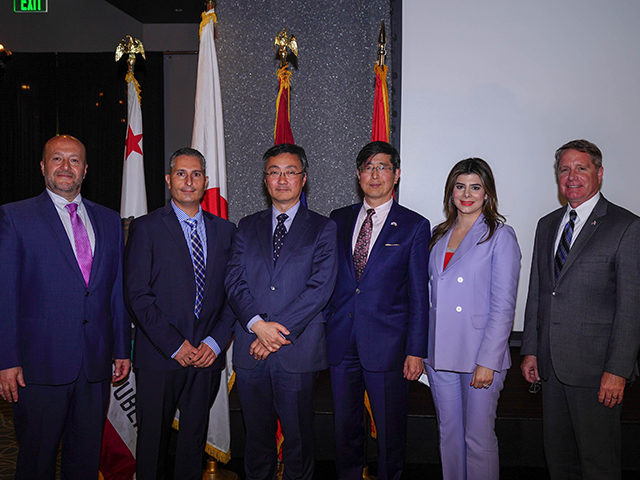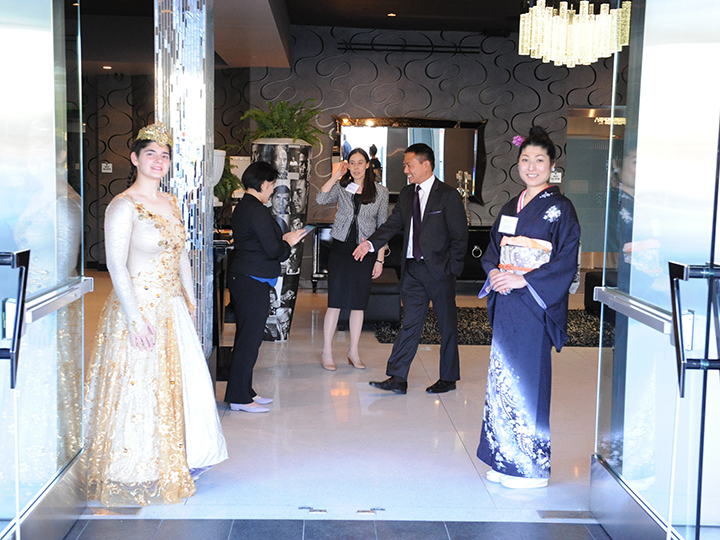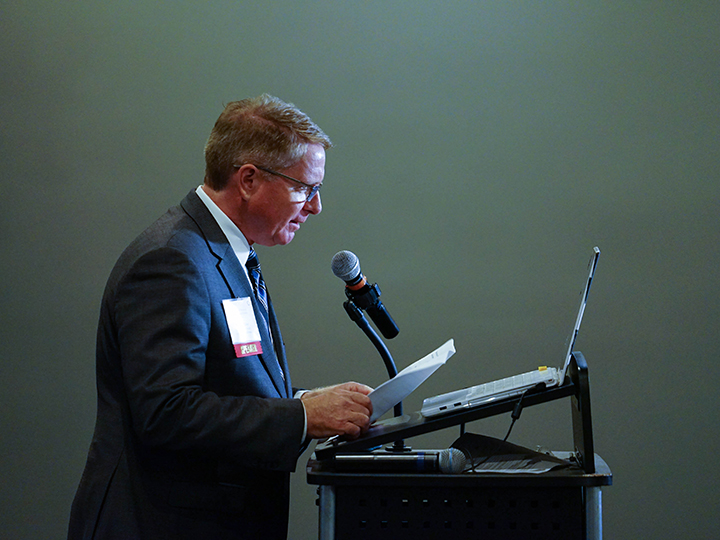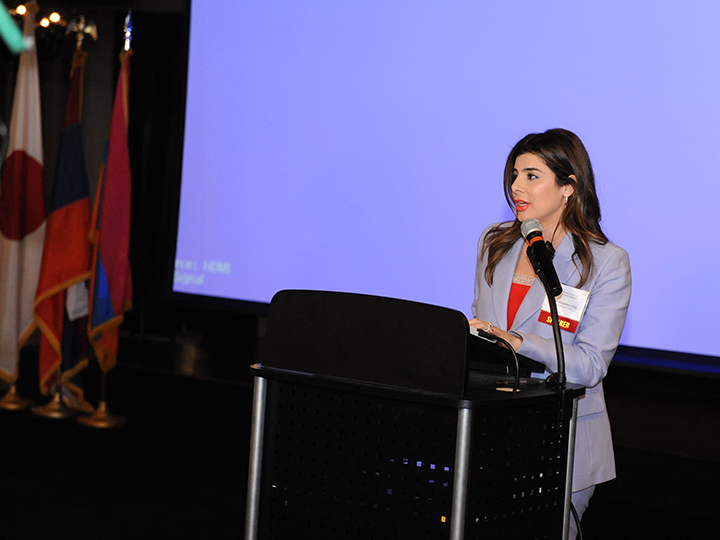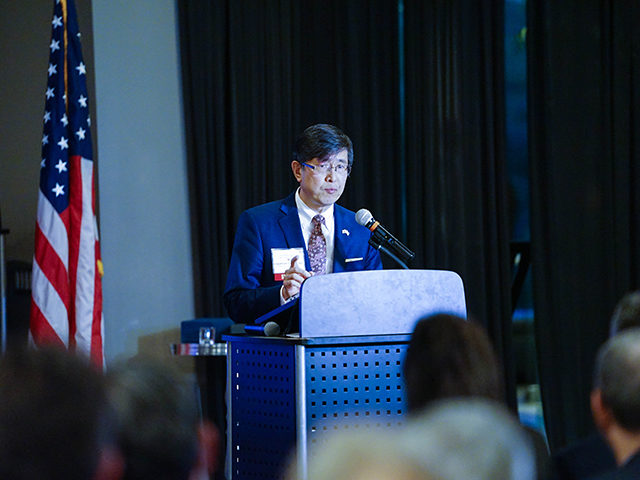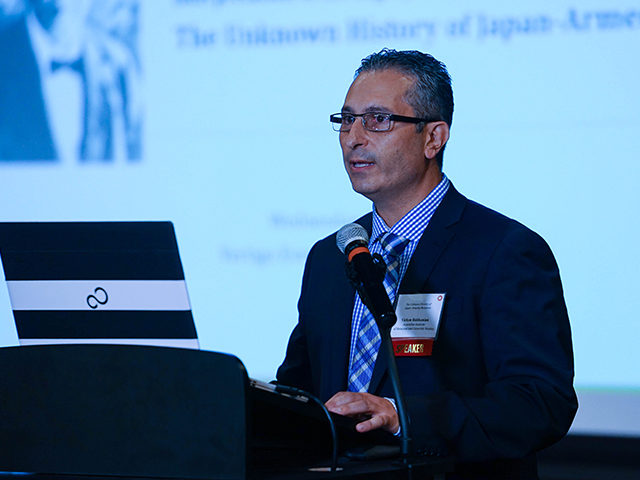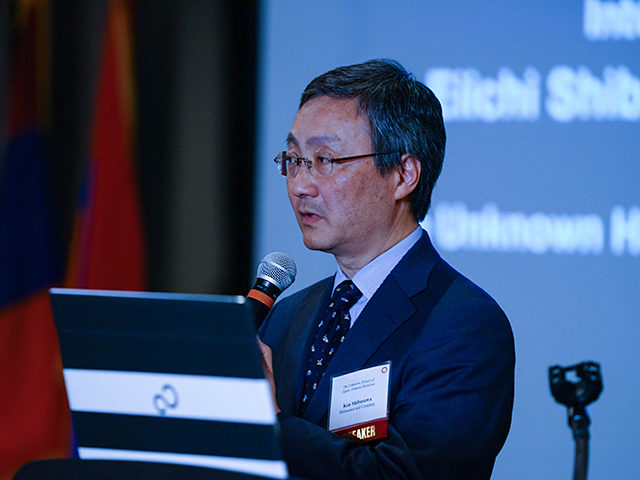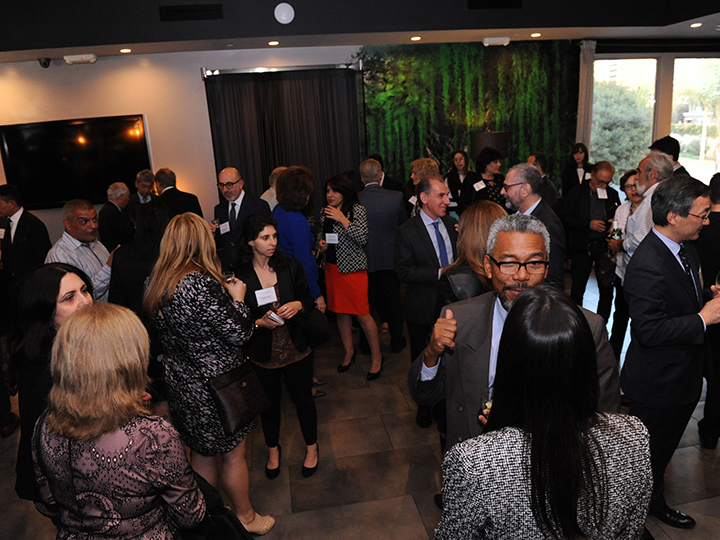ANCA-WR Spotlights Japan-Armenia Relations in Unique Cross-Cultural Event
April 4, 2018GLENDALE – The Armenian National Committee of America – Western Region’s Community Relations Committee and the Japan America Society of Southern California came together on March 28 to honor the legacy of Viscount Eiichi Shibusawa while spotlighting a significant historical chapter in Japan-Armenia relations.
Over 100 distinguished guests, community leaders, and supporters gathered at Vertigo in Glendale for the event entitled “Interpretation of the Legacy of Eiichi Shibusawa for the 21st Century: The Unknown History of Japan-Armenia Relations,” which featured keynote speakers independent researcher Vicken Babkenian and Ken Shibusawa, the great great grandson of Eiichi Shibusawa. The event also featured remarks by Community Relations Committee Chairperson Vanna Kitsinian, Esq. and independent researcher and committee member Missak Kelechian, as well as the Japanese Consul General of Los Angeles, Mr. Akira Chiba. The event offered traditional Japanese and Armenian appetizers. To emphasize cross-cultural cooperation between the two communities, guests were welcomed by two cultural ambassadors, one dressed in a traditional Japanese “kimono,” and another in an authentic Armenian “daraz.”
The event began with opening remarks by the evening’s Master of Ceremonies, Doug Erber, President of the Japan America Society of Southern California. In welcoming the guests, Erber expressed his appreciation for the collaboration between the two organizations and the Japanese Consulate in organizing such a unique event together.
Welcoming remarks were made by Vanna Kitsinian, the Chair of ANCA-WR’s Community Relations Committee, who provided a brief background on the ANCA-WR’s past campaign called “America We Thank You: An Armenian Tribute to Near East Relief,” which inspired the current work of the Community Relations Committee and this event in particular. Kitsinian explained that the mission of the committee was to remind the world, particularly America, of the pivotal role its government and people played in helping save the lives of thousands of Armenian orphans and refugees following the Armenian Genocide of 1915.
“The Near East Relief campaign spanned 15 years and continued until 1930 and although it started as an American-led initiative, it eventually became an international objective, spanning the entire world and included nearly every country across the globe. One of those model countries was Japan,” said Kitsinian. She then went on to elaborate on the historical ties between the Armenian and Japanese people, referencing Diana Abcar, Armenia’s Ambassador to Japan during the First Armenian Republic. “Living in Japan since 1891, Apcar spent her entire adult life being a crusader for the cause of the oppressed, principally those of her destitute brethren, refugees and survivors of the Genocide who had found their way to Japan,” added Kitsinian.
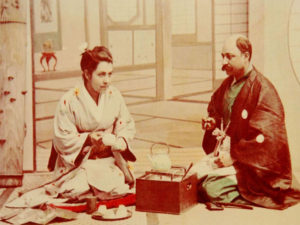
Next, Mr. Akira Chiba, Consul General of Japan in Los Angeles, expressed his gratitude to the co-hosting organizations, as well as the keynote speakers who travelled from Australia and Japan to be present for this event. He noted that his family and that of Viscount Shibusawa have maintained ties for generations and expressed hope that similar events in the future will help inform the respective communities about the unknown history between the Armenians and Japanese.
The purpose of the event was to uncover a Japanese link to Armenian history in the post genocide era. Babkenian, the author Armenia, Australia and the Great War, has conducted extensive research on Japan’s humanitarian response during and after the Armenian Genocide. He explained how the Armenian Relief Committee of Japan came to be formed in Tokyo, following a visit by the Rev. Loyal Wirt, the international commissioner of the American Near East Relief organization. Soon after its establishment, Viscount Eiichi Shibusawa became the Chairman of the Armenian Relief Committee of Japan and helped save the lives of hundreds of Armenian and Greek refugees.
In his powerful remarks, Babkenian highlighted the links between Japan and Armenia by emphasizing the humanitarian aid led by Viscount Shibusawa, the role of Diana Apcar, and the remarkable story of Japanese humanitarianism during the Armenian Genocide. Babkenian had previously served as a member consultant of the ANCA-WR’s America We Thank You Committee. Babkenian then detailed Shibusawa’s role in leading Japan’s humanitarian response to the Armenian Genocide, as well as his invitation to a 100 Japanese leaders urging them to provide assistance to his efforts. Japan also participated in the international Golden Rule Sunday Program, which the Near East Relief publication reported on in 1926.
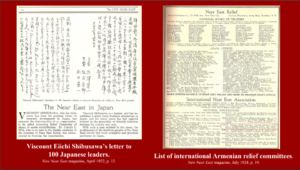
Babkenian explained how Japan was also one of the first nations to respond with aid following the 1988 Spitak earthquake in Armenia. In turn, Armenia also provided assistance during the 2011 tsunami earthquake in Japan. According to Babkenian, the Japan International Cooperation Agency still continues to provide assistance in Armenia today. “Japan and Armenia are countries that share a rich cultural heritage and a long history of civilization. They are geographically far apart but they were brought together a century ago by a humanitarian bond that helped the Armenians survive as a people and a nation,” he concluded.
In his keynote address, Ken Shibusawa delivered a summary of Viscount Shibusawa’s life from his early beginnings to his work of bringing capitalism to Japan, as well as his role in founding hundreds of enterprises and economic organizations. Viscount Shibusawa was a leading figure in the development of Japan’s modern society from the late nineteenth century through the early years of the twentieth century. Viscount Shibusawa was the founder of the Bank of Japan and is known for hundreds of achievements in social welfare, education, and international exchange.
During his powerpoint presentation, Mr. Shibusawa shared newspaper articles that were published through the efforts of Viscount Shibusawa to educate others and spread awareness about the tragedies that took place against the Armenians in order to urge individuals to donate and assist them. Shibusawa added, “I also especially want to thank Mr. Babkenian for finding this wonderful story that I did not know until six months ago, because without him, I wouldn’t be here today.”
Following the two keynote speakers, independent researcher and expert on Near East Relief Missak Kelechian delivered emotionally stirring remarks which elaborated on Babkenian’s report regarding the humanitarian rescue by the Japanese during the Great Fire of Smyrna in 1922. With photos of distraught victims, he explained the background of the fire and stated that although there were British, French, and American ships nearby, all refused to help the victims. Kelechian explained that it was only a Japanese ship named “Tokei Maru” that allowed the victims aboard, thanks to their courageous captain whose name unfortunately is still currently unknown.
It proved to be a dramatic portion of the evening when Kelechian shared the life of Berj Zamkochian, an Armenian-American organist who was born in Boston in 1929 and passed away in 2004. Zamkochian was appointed to the Boston Symphony Orchestra and was a world renowned organist, having played for six U.S. Presidents, the Pope, and the Imperial Family of Japan. Kelechian proceed to play a video clip from one of Zamkochian’s performances during the opening ceremony of the Temple of Shinji Schumel Jai in Shiga-Japan where he surprised everyone with his emotional personal story of his how his father was saved by a Japanese Cargo Ship during the Great Fire of Smyrna, evoking clearly audible reactions from the crowd.
Following these presentations, there was an opportunity for a question and answer session. Thereafter, Kitsinian presented plaques of recognition on behalf of the ANCA-WR Community Relations Committee to Vicken Babkenian in appreciation for his tireless efforts in researching and unveiling the shared history of Japan and Armenia, as well as to Ken Shibusawa in recognition of Viscount Eiichi Shibusawa’s exceptional leadership of the Armenian Relief Committee of Japan. Explaining that compassion without action is simply observation, Kitsinian noted that Japan’s humanitarian action is what made them exemplary as it relates to Armenians during the post-Genocide era.
Elected officials present at the event included Mayor of the City of Glendale, Zareh Sinanyan, Glendale City Council Member Vartan Gharpetian (then Mayor of the City of Glendale), and Council Member of the City of Sierra Madre, John Hairabedian. A representative from State Senator Anthony Portantino’s office as well as Assemblymember Laura Friedman’s office were also present. In attendance were also six Superior Court Judges of the State of California, of Armenian, Japanese, and American descent.
The Armenian National Committee of America-Western Region is the largest and most influential Armenian-American grassroots advocacy organization in the Western United States. Working in coordination with a network of offices, chapters, and supporters throughout the Western United States and affiliated organizations around the country, the ANCA-WR advances the concerns of the Armenian American community on a broad range of issues.
